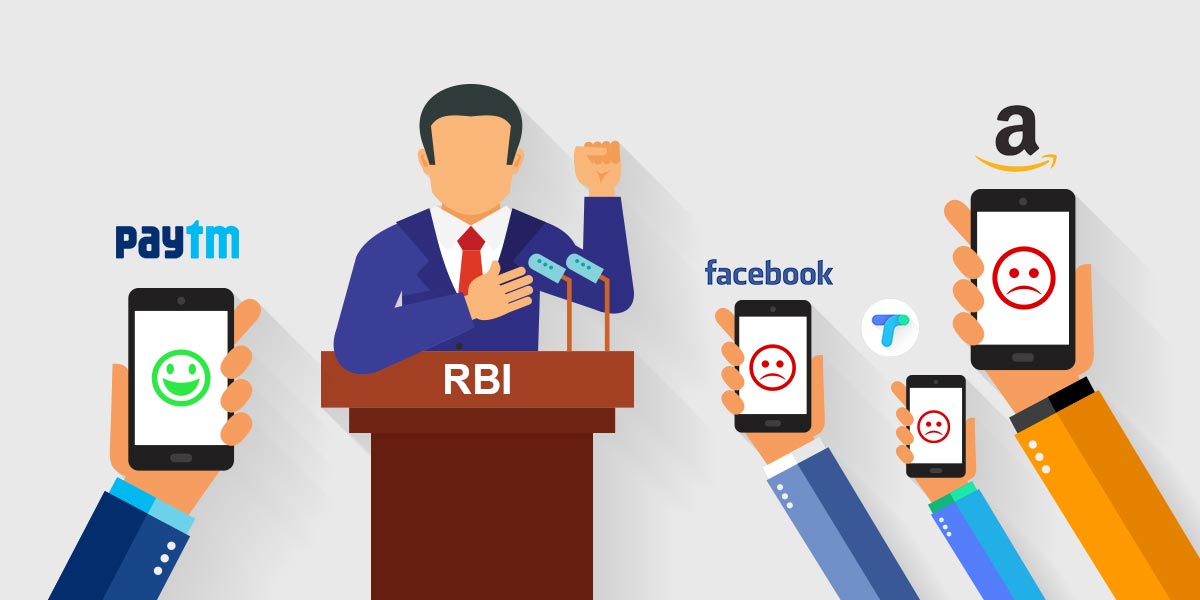The Reserve Bank of India (RBI) mandate on data storage has put almost digital payment industry into a split.

Differences over RBI data storage diktat: Paytm stands in support while Google and FB express concern.
While payment players like Paytm and Microsoft have supported the RBI demand to store data within India, foreign players like Google, Amazon, Facebook and WhatsApp, who have recently launched their payment apps in the country, are in disarray.
Not happy with the RBI mandate, the digital players constituting the industry is mulling to send a formal representation to the regulator highlighting its concerns. Many of them raised concerned about not being consulted before drafting the ruling.
“What RBI is doing is heavyhandedness. A regulator should not bring about such fundamental changes without consultation with a cross-section of affected parties,” said Subho Ray, president of Internet and Mobile Association of India (IAMAI) to ET. He also advocated trying an alternative solution in dual location concept.
In April first week, the RBI had asked all payment players to ensure data related to payment system be stored inside the country within six months. The Apex bank in its regulatory policy observed that currently only certain payment system operators and their outsourcing partners store the payment system data either partly or completely in India.
Ensuring the safety and security of payment systems data by adoption of the best global standards and their continuous monitoring and surveillance is essential to reduce the risks from data breaches while maintaining a healthy pace of growth in digital payments, noted the regulator in a press statement.
The development is said to come after many incidents of data breaches including Cambridge Analytica-Facebook leak incident, where 87 millions data of the social site users were reportedly breached and used to reach voters on social media with personalised messages during now US president Donald Trump’s campaign in the US.
Facebook has faced flaks from governments across the globe including India. Following the incident, the government had sent a show-cause notice to social giant asking whether the personal data of Indian voters and users has been compromised by Cambridge Analytica.
Meanwhile, Alibaba-backed Paytm has supported the RBI move saying the mandate has come at the right time when payment companies are witnessing unprecedented growth.
Paytm CEO Vijay Shekhar Sharma earlier said that some regulations are required to strengthen privacy law and safeguard consumers’ data against leakage. He also emphasised that users crucial data including financial ones shouldn’t go outside of the country.
Sharma had criticised Facebook and WhatsApp for its alleged circumvention of regulations while launching UPI-enabled payment feature. He even termed the world’s largest social network ‘the evilest company in the world’.
Meanwhile, Master card is also planning to discuss the details of the directive with the central bank.
Currently, there are multiple players such as Paytm, Itz Cash, CC Avenue and Citrus as well as global players including Uber, WhatsApp, Amazon, Facebook, and Google. Facebook is also staging beta test for its own payment product in India.
The Mark Zuckerberg-led firm’s payment product is an independent play and will compete with WhatsApp UPI.
Notably, post demonetisation, the digital payments ecosystem witnessed a growing interest of foreign players, looking to cash-in on the growing opportunity in India. Payments ecosystem in the country is being built on public infrastructure like UPI and Aadhaar that allow open-architecture and an inter-operable payment system to evolve.
India’s digital payment space is expected to grow the segment by about five-fold to $1 trillion by 2023. It is currently estimated to be around less than $200 million, according to Credit Suisse report.
 Indilens Web News Live Daily News on India ! Insights of India
Indilens Web News Live Daily News on India ! Insights of India


